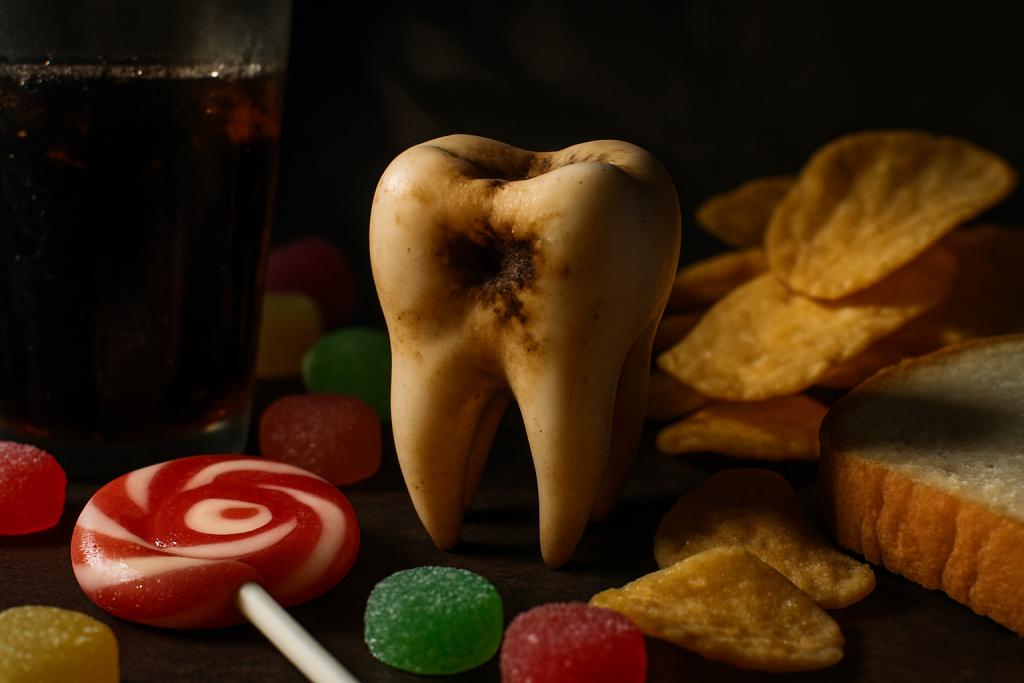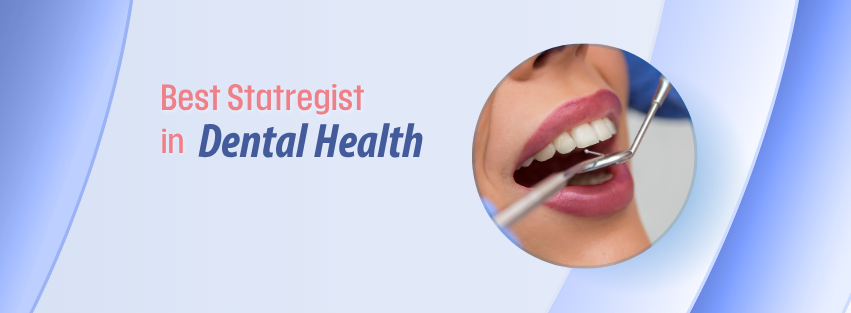
The most common cause of tooth decay and how it develops:
Tooth decay is a prevalent issue affecting people of all ages, and understanding its most common cause is essential for maintaining good oral health. The primary culprit behind most tooth decay cases is the buildup of specific bacteria in our mouths that produce acid.
When these bacteria feed on sugars and starches from the foods we eat, they convert these substances into acid, which can wear away the enamel on our teeth. Let’s explore how this process occurs and what actions you can take to prevent it.
Every time you consume food, especially sugary items, these bacteria—like Streptococcus mutans—start to thrive. Here’s a closer look at how tooth decay develops:
- Food Consumption: When we eat, bits of food remain in our mouths. Sticky foods like candy or even regular meals, especially those high in sugar, can linger on your teeth.
- Bacterial Activity: The bacteria in plaque feed on these remains. This feeding process leads to the production of acid. Over time, this acid can erode the enamel layer that protects your teeth.
- Enamel Erosion: As the enamel wears down, your teeth become more vulnerable to decay. Once the enamel is compromised, the softer part of the tooth, called dentin, becomes exposed.
- Progression to Cavities: If left untreated, the decay will continue to deepen, eventually leading to cavities. This process can occur over months or even years without visible signs if not regularly checked by a dentist.
The development of tooth decay is not just about sugar consumption; several other factors contribute to this condition:
- Oral Hygiene: Poor brushing and flossing habits allow plaque to accumulate. Regular dental care is crucial to wash away food particles and bacteria.
- Diet: A diet high in sugar, particularly simple carbohydrates, can significantly increase the risk of decay. Foods and drinks like soda, candy, and baked goods provide a feast for decay-causing bacteria.
- Fluoride Exposure: Fluoride helps to strengthen teeth and can prevent decay. If you live in an area with low fluoride levels in the water, you may need additional fluoride treatments.
- Saliva Production: Saliva plays a vital role in neutralizing the acids produced by bacteria. Reduced saliva flow, known as dry mouth, can leave your teeth unprotected against decay.
Recognizing these factors can help you take proactive steps toward preventing tooth decay. Here are some useful recommendations:
- Brush Regularly: Brush your teeth at least twice a day with fluoride toothpaste to remove plaque and food particles.
- Floss Daily: Flossing helps to eliminate debris that a toothbrush might miss, especially between teeth and along the gum line.
- Limit Sugar Intake: Try to cut back on sugary snacks and beverages. When you do indulge, consider doing so during meals rather than as stand-alone snacks.
- Drink Water: Stay hydrated with water, especially if it contains fluoride. Water helps rinse away food particles and neutralizes harmful acids.
- Regular Dental Check-ups: Visit your dentist every six months. Regular examinations can help detect early signs of decay and other dental issues.
Tooth decay develops due to a combination of factors, but the critical element is the presence of harmful bacteria that thrive on sugars.
By understanding how tooth decay progresses and implementing good oral hygiene practices, you can significantly lower your risk of developing cavities. Remember, a little effort goes a long way in keeping your teeth healthy and beautiful!
The role of sugar in tooth decay and preventive measures:
Many people enjoy sweets, but sugar plays a crucial role in causing tooth decay. It’s essential to understand how sugar affects your dental health and explore effective ways to prevent tooth decay.
Tooth decay begins with the bacteria that live in your mouth. These bacteria thrive on sugars found in the food you eat. When you consume sugary foods or drinks, the bacteria feed on these sugars and produce acids as a byproduct.
These acids can attack the tooth enamel, leading to the formation of cavities. Therefore, knowing the connection between sugar and tooth decay can help you make better choices for your oral health.
Here are some key points about sugar and its role in tooth decay:
- Types of Sugar: There are natural sugars found in fruits and some dairy products, and then there are added sugars in processed foods and beverages. While both types can contribute to tooth decay, added sugars are usually more harmful due to their higher concentrations and prevalence in many foods.
- Frequency of Consumption: It’s not just the amount of sugar you consume that matters, but how often you consume it. Snacking on sugary foods throughout the day leads to constant acid attacks on your teeth, increasing the risk of decay.
- Sticky Foods to Avoid: Certain sticky candies and snacks can adhere to your teeth longer, allowing bacteria to produce acids over an extended period. These foods, such as gummies and caramels, can be particularly harmful.
Preventing tooth decay largely depends on limiting sugar intake and practicing good oral hygiene. Here are some tips to help you protect your teeth:
- Limit Sugary Foods and Drinks: Cut down on sweets, sodas, and energy drinks. If you choose to indulge, try to do so in moderation and at specific times instead of frequent snacking.
- Read Labels: Always check the nutrition labels for added sugars. Being aware of how much sugar is in your favorite foods can help you make healthier choices.
- Choose Healthier Alternatives: When you crave something sweet, opt for fruits or yogurt instead of candy or pastries. These options provide natural sugars and are less harmful to your teeth.
Good oral hygiene practices also play a vital role in preventing decay:
- Brush Twice Daily: Use a fluoride toothpaste to brush your teeth at least twice a day. Make sure to brush for a full two minutes to remove any sugars and plaque that might lead to decay.
- Floss Daily: Flossing helps you clean between your teeth where a toothbrush may not reach. This can remove trapped sugars and bacteria, making it an essential part of your routine.
- Regular Dental Visits: Schedule regular check-ups with your dentist. Professional cleanings and examinations can catch potential issues early and help you maintain good oral health.
Furthermore, empowering yourself with knowledge about your oral health can lead to better choices. Educational resources available in dental offices and community programs can provide valuable insights into maintaining healthy teeth.
Remember, your diet plays a direct role in your dental health. Avoiding excessive sugar is not just about preventing cavities; it can also contribute to overall well-being. A well-balanced diet, rich in vitamins and minerals, supports strong teeth and gums. Foods like leafy greens, nuts, and dairy products can help strengthen your dental health.
How oral hygiene practices impact tooth decay risk?
Maintaining good oral hygiene practices is essential for preventing tooth decay and ensuring overall dental health. You might wonder how your daily habits affect your risk of developing cavities.

Understanding the relationship between oral hygiene and tooth decay will empower you to take better care of your teeth. Here are the key ways in which oral hygiene practices impact the risk of tooth decay.
Daily brushing:
Brushing your teeth is the cornerstone of oral hygiene. When you brush at least twice a day, you remove the food particles and plaque that accumulate on your teeth. Plaque is a sticky film of bacteria that forms on your teeth, and it produces acids that can erode tooth enamel, leading to decay.
Consider these tips to enhance brushing effectiveness:
- Use fluoride toothpaste: Fluoride helps to strengthen tooth enamel and makes it more resistant to acids.
- Brush for at least two minutes: Take your time to ensure that you reach all surfaces of your teeth.
- Practice the right technique: Use gentle circular motions rather than vigorous scrubbing, which can damage gums and enamel.
Flossing: A vital step.
Flossing is just as crucial as brushing but is often overlooked. Most cavities form between teeth, where your toothbrush can’t reach. Flossing daily helps to remove food particles and plaque from these tight spaces, significantly reducing your risk of tooth decay.
Here’s how to floss properly:
- Use enough floss: Break off about 18 inches of floss to ensure you have enough to work with.
- Wrap the ends: Wrap each end around your fingers to ensure you have a good grip.
- Be gentle: Slide the floss between your teeth and curve it around the base of each tooth.
Mouthwash and rinsing:
Using mouthwash can provide an additional layer of protection against tooth decay. It helps to kill bacteria, reduces plaque buildup, and can freshen your breath. However, mouthwash should complement brushing and flossing rather than replace them.
Look for mouthwashes that contain fluoride for extra cavity protection. Rinse your mouth as directed, usually twice a day, for optimal results.
A healthy diet:
Your diet plays a significant role in your oral health. Foods high in sugars and carbohydrates feed the bacteria in your mouth, which produce acids that lead to tooth decay. To lower your risk, consider these dietary tips:

- Limit sugary snacks and drinks: Choose water or milk over sugary beverages.
- Opt for healthy snacks: Fresh fruits, vegetables, cheese, and nuts promote good oral health.
- Stay hydrated: Drinking plenty of water helps wash away food particles and neutralizes acids.
How sugar affects your teeth?
Sugar is one of the most significant culprits in tooth decay. When you consume sugary foods and drinks, bacteria in your mouth feed on the sugar and produce acids. These acids can erode the protective enamel on your teeth. Over time, this erosion can lead to cavities. Here are some common sources of added sugars you should be aware of:
- Sodas and sweetened beverages
- Candies and sweets
- Baked goods like cakes and cookies
- Some sauces and dressings
To protect your teeth, limit your intake of these sugars. Try substituting sugary treats with healthier options like fruits or nuts.
The importance of calcium and vitamin D:
Calcium and vitamin D play crucial roles in keeping your teeth and bones strong. Calcium helps build and maintain strong enamel, while vitamin D improves calcium absorption in your body. Foods rich in calcium include:
- Dairy products like milk, cheese, and yogurt
- Leafy green vegetables such as kale and broccoli
- Fortified foods like cereals and plant-based milk
These foods into your diet can lead to better dental health. Furthermore, consider spending some time outdoors to get enough sunlight, which helps your body produce vitamin D.
Hydration and oral health:
Staying hydrated is essential for your overall health, including your oral health. Drinking water helps wash away food particles and bacteria in your mouth. It also keeps your saliva levels up, which is vital for neutralizing acids produced by bacteria. Here are some hydration tips:
- Drink plenty of water throughout the day.
- After meals, rinse your mouth with water to reduce acidity.
- Limit sugary drinks and opt for water instead.
Proper hydration can significantly enhance your dental health and help you avoid problems in the future.
The role of fiber in your diet:
Diets high in fiber are beneficial for your teeth and gums. Fiber-rich foods, like fruits, vegetables, and whole grains, help remove plaque and prevent cavities. They also stimulate saliva production, which is essential for neutralizing acids in your mouth. Some excellent fiber sources include:
- Apples and pears
- Carrots and celery
- Whole grain breads and pastas
Including more of these foods in your meals can greatly enhance your dental health.
Foods to avoid for better dental health:
While some foods are good for your dental health, others can be harmful. Here are some foods you may want to limit:
- Sticky candies that cling to your teeth
- Citrus fruits that can erode enamel if consumed in excess
- Alcohol, which can dry out your mouth and reduce saliva production
Being mindful of these foods helps you make better choices for your oral health.
Conclusions:
Tooth decay remains a significant health concern, primarily driven by the consumption of sugar and poor oral hygiene practices. Understanding that sugar acts as a primary catalyst for decay is crucial.
When sugars from foods and beverages linger on your teeth, bacteria feed on them, producing acid that erodes enamel and leads to cavities. Preventing tooth decay begins with minimizing sugar intake and ensuring you maintain a balanced diet rich in nutrients that encourage dental health, like calcium and vitamins.
Equally important are solid oral hygiene habits. Brushing at least twice a day with fluoride toothpaste, flossing daily, and attending regular dental check-ups can significantly reduce your risk for tooth decay. These practices not only maintain a cleaner mouth but also help in the early detection of dental issues.
